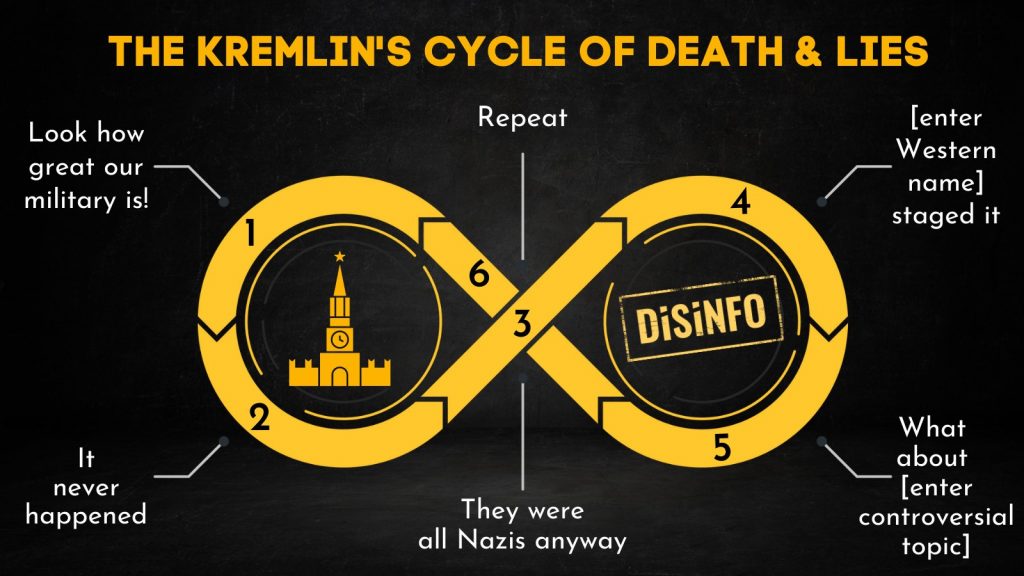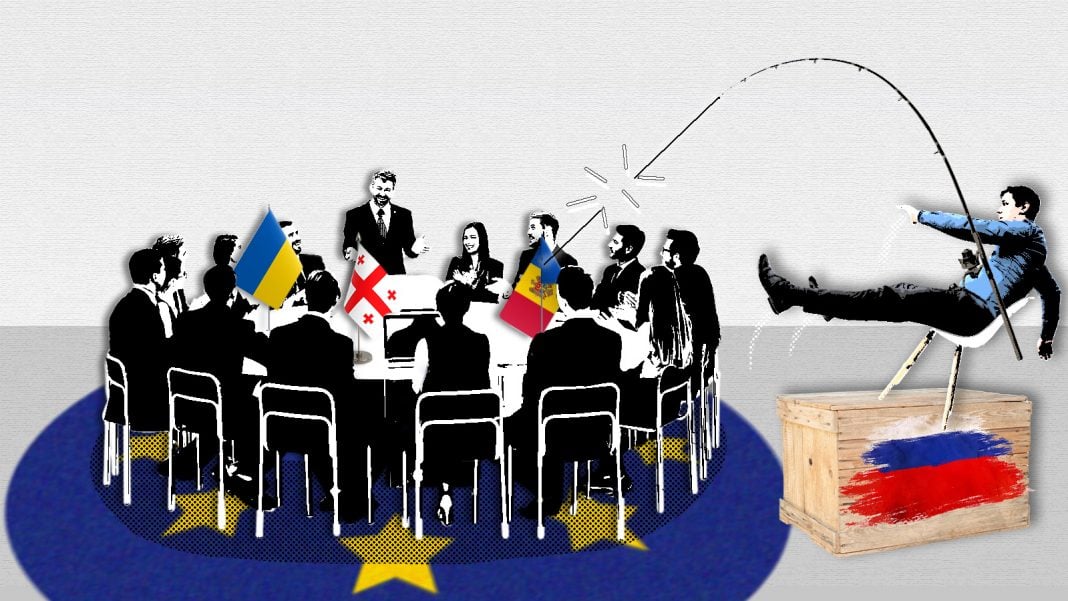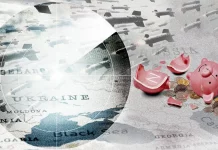On 23 June 2022, the European Council granted candidate status to Ukraine and Moldova and expressed readiness to do the same for Georgia once the priorities specified in the Commission’s opinion on Georgia’s membership application have been addressed.
The Russian state-controlled disinformation outlets and their amplifiers seized the truly historic moment to spin their deceitful claims about the EU’s enlargement. While the initial reaction of the pro-Kremlin disinformation ecosystem was somewhat reserved, it quickly turned to recycling some of the well-established pro-Kremlin narratives it had used to discredit the Eastern Partnership in the past. It was not long until the claims of the EU allegedly enslaving neighbouring countries, using Ukraine and Moldova as political tools, and making false promises to scam the candidates started pouring in. Among the more prominent disinformation narratives were also attempts to delegitimise the EU accession process, by claiming the decisions of the Council are destructive and rushed , and comparing this decision with the time it took the EU to grant candidacy status to other countries to “prove” these claims.
Some of the more far-out disinformation claims also included false allegations that the candidate status to Moldova was given in exchange for joining EU sanctions against Russia or unfounded claims that Romania sought to incorporate Moldova into its territory through the EU accession process.
Targeting the EU’s partners is not a novel exercise for the Kremlin’s propagandists and information manipulators. EUvsDisinfo has catalogued more than a few examples over the years. Recycling disinformation is also a commonly employed tactic. After all, if you repeat a lie enough times, people might start believing it. So far, this seems to be the approach favoured by the pro-Kremlin disinformation outlets to obstruct Ukraine, Moldova and Georgia’s paths to the EU.
Admittedly, this is a tough balancing act for the Kremlin. On one hand, they have to appear tough and unnerved by the recent decisions of the European Council, claiming that this is “an internal EU matter” and does not present any threat to Russia. On the other hand, the pro-Kremlin disinformation apparatus sustained by exploiting fears and insecurities has to continue decrying “Western expansionism” and drum up the threat of encirclement of Russia. The constant self-victimisation is an important element to rally the people behind the Kremlin’s banners. This point was driven home by Mr. Lavrov claiming that the “European Union and NATO are building a coalition against Moscow” and even likening these efforts to the Nazi attack on the Soviet Union during the Second World War.
Boundless Impunity in the Face of War Crimes
Painting its adversaries generously with the “Nazi brush” has become one of the defining elements of the pro-Kremlin disinformation about Russia’s unjustifiable war of aggression against Ukraine. And it goes hand-in-hand with an increasingly aggressive rhetoric, often amounting to hate speech, to dehumanise and vilify the innocent victims of Russia’s aggression. The Kremlin’s cycle of death and lies continues to spin on with near total impunity to justify the unjustifiable.

On the 27 June, the world learned of a yet another atrocity committed by Russia’s invading forces in Ukraine. A missile strike on a shopping mall in Kremenchuk killed at least 18 people, with dozens more missing in the rubble of the destroyed building. The pro-Kremlin disinformation apparatus quickly deployed the same tactic we have seen time and again, from bombing a maternity hospital in Mariupol, to covering up Russia’s war crimes in Bucha. First came the silence and denial, refusing to admit the attack had occurred. Then came the cries of an alleged Ukrainian provocation, reminiscent of the debunked pro-Kremlin claims about Bucha. Once more evidence was gathered and the culpability could no longer be denied, it was time to blame the victims, with false claims of Russia hitting a secret Western ammunition and weapons depot. And to top it off with a good measure of distraction, the Russian state-controlled disinformation outlets deployed its favoured tactic of “whataboutism”, making false claims of NATO planning to establish bases in Luhansk.
None of the Kremlin’s claims are grounded in reality or substantiated by facts, but the human suffering it inflicts and the violence it enables against civilians is all too real. The lies, manipulation and disinformation pave the way for such atrocities and have to be exposed and denounced unequivocally. EUvsDisinfo has already collected 14 000 examples of Russia’s ongoing disinformation campaigns and will continue to update its repository for as long as the challenge remains.
Also on EUvsDisinfo’s radar this week:
- Unsubstantiated claims that anti-Russian sanctions have caused a global food crisis are constantly propagated throughout the pro-Kremlin disinformation ecosystem, including by Russia’s top level “diplomats”. No, the EU sanctions are not to blame. The global food security crisis was exacerbated by Russia’s unjustifiable war of aggression against Ukraine.
- Pro-Kremlin outlets continue to make false accusations against Lithuania for restricting the transit of goods to Kaliningrad. No, Lithuania is not encroaching on the sovereignty of Russia, and no, there is no “blockade” of Kaliningrad. Lithuania is just implementing the EU sanctions.
- As expected, the NATO Summit in Madrid has become a target for pro-Kremlin disinformation outlets, singing the same old song of “encirclement of Russia” and “Western expansionism”. In fact, NATO’s Open Door Policy does not threaten Russia, and no, the Alliance is not trying to encircle Russia;
- For the connoisseurs of more conspiracy-flavoured disinformation, the pro-Kremlin disinformation ecosystem amplified the narrative of alleged secret negotiations between the Germany and Russia to divide Ukraine. No, there are no secret negotiations and there is no breakdown in German-Ukrainian relations.





